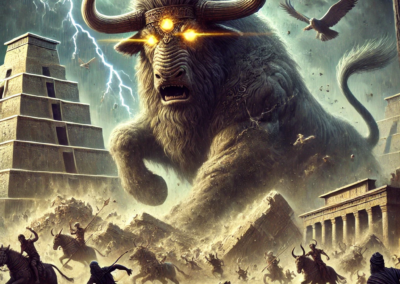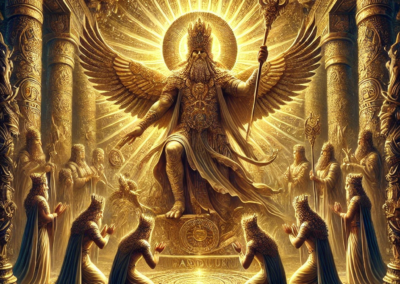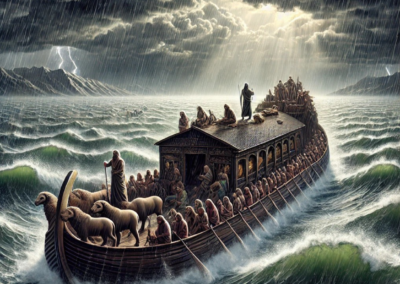They Had a God for Everything: Mesopotamia’s Divine Pantheon
How the Quirky Gods of Mesopotamia Inspired the Humor and Depth of The Funny Epic of Gilgamesh*
In the land of ancient Mesopotamia, gods weren’t just divine beings—they were celebrities, troublemakers, and occasionally the biggest drama queens around. These gods played a central role in daily life, with each one responsible for a specific domain, from love and war to wind and wisdom.
The Mesopotamian pantheon is as vast as it is fascinating, and it provided endless inspiration for The Funny Epic of Gilgamesh. From Ishtar’s flair for the dramatic to Shamash’s wise guidance, these deities became key characters in my retelling, adding both humor and heart to the story.
The Divine Hierarchy: Gods and Their Roles
The Mesopotamian gods were like a cosmic family, with major deities ruling over essential aspects of life and a host of minor gods handling more niche responsibilities.
The Big Names in the Pantheon
- Anu: The sky god and head honcho. Think of him as the CEO of the divine world, though he often let others handle the day-to-day chaos.
- Enlil: The god of air, storms, and fate. Known for his temper, Enlil wasn’t afraid to make drastic decisions—like unleashing a flood.
- Ea (Enki): The clever god of water and wisdom. Ea was a problem-solver and often the one who bailed humanity out of trouble.
- Ishtar (Inanna): The goddess of love, war, and, let’s be honest, a flair for the dramatic. Ishtar’s stories are full of passion, conflict, and a touch of chaos.
Gods in Everyday Life
The Mesopotamians believed their gods were deeply involved in human affairs, and they worshipped them with ceremonies, offerings, and prayers. Temples were the hub of religious activity, and each city had a patron deity.
Offerings Fit for a God
To keep the gods happy, people offered food, drink, and even music. If a god was upset, bad things could happen—like droughts, floods, or invasions. No pressure, right?
Divine Drama: Gods in Myths
Mesopotamian myths are full of divine antics that rival any soap opera. The gods were powerful but also flawed, which made their stories relatable—and ripe for humor.
Ishtar’s Epic Temper Tantrum
One of the most famous stories in Mesopotamian mythology involves Ishtar proposing to Gilgamesh. When he rejects her—after bluntly listing all her exes who met rather unfortunate ends—Ishtar throws a legendary tantrum and sends the Bull of Heaven to attack Uruk, resulting in chaos and destruction.
In The Funny Epic of Gilgamesh, I’ve given this tale a playful twist. Instead of a jealous and vengeful goddess, Ishtar is portrayed as Gilgamesh’s sweet but strong-willed sister, who constantly tries to bring balance to his reckless life. The story retains its humor, but rather than outright rejection and divine retribution, it focuses on their sibling banter, Ishtar’s stubbornness, and her determination to keep Gilgamesh in check.
This reimagining brings a fresh perspective to the epic, blending adventure, humor, and a touch of family dynamics.
The Gods and the Flood
In ancient Mesopotamian mythology, one of the most iconic tales is the story of the Great Flood, where Enlil, the king of the gods, decided to flood the earth—not because of human wickedness, but because humans were simply too noisy, disturbing the gods’ peace. However, Ea, the clever god of wisdom, secretly warned a righteous man named Utnapishtim, instructing him to build a large boat to save his family, animals, and plants. As the floodwaters raged for seven days and seven nights, wiping out everything in their path, Utnapishtim’s boat remained afloat, eventually resting on Mount Nisir. After offering a sacrifice to the gods, Utnapishtim was rewarded with immortality, becoming a symbol of divine favor and human resilience. This tale, deeply rooted in the unpredictable floods of the Tigris and Euphrates, reflects the Mesopotamians’ awe of nature and their belief in the gods’ complex, often whimsical, personalities.
The Lesser-Known Gods
While the big names get most of the spotlight, Mesopotamia had gods for almost everything:
- Ninkasi: Goddess of beer. (A favorite of both humans and gods.)
- Nisaba: Goddess of writing and scribes. (Thank her for the clay tablets that preserved their myths.)
- Adad: God of storms. (He’s the one shaking things up when the weather turns bad.)
These lesser-known gods added depth to Mesopotamian culture and inspired fun moments in my story, like a hypothetical scene where Enkidu prays to Ninkasi for a never-ending beer jar.
Gods as Characters
What makes the Mesopotamian gods so fascinating is their humanity. They loved, fought, laughed, and sometimes made terrible decisions—just like us. In The Funny Epic of Gilgamesh, I wanted to bring out these traits, making the gods relatable and funny without losing their grandeur.
For example:
- Ishtar: The goddess of love and war, I reimagined as Gilgamesh’s witty and fashionable younger sister. With a wit as sharp as her impeccable style, she balances Gilgamesh’s brazen boldness with grace, empathy, and a much-needed refreshing dose of reality.
- Nabu:The god of wisdom, writing, and scribes. I portrayed him as the wise and loyal Vizier, the voice of reason amidst chaos.
- Ashur: A god associated with kingship, war, and empire-building, whom I reimagined as the ambitious and cunning Master of Palace Affairs, always plotting grand schemes and intrigued by power dynamics.
Humor in Divine Relationships
The relationships between the gods were as complicated as any family drama:
- Sibling rivalries? Check.
- Romantic entanglements? Absolutely.
- Power struggles? All the time.
I leaned into these dynamics to create comedic tension, imagining the gods bickering over whose temple got the best offerings or who deserved credit for humanity’s success.
Lessons from the Gods
Despite their flaws, the Mesopotamian gods taught important lessons about life:
- Respect for Nature: Many myths emphasize the power of natural forces, reminding humans to live in harmony with their environment.
- Humility: The gods often punished arrogance, a theme reflected in Gilgamesh’s journey.
- Community: Worship and rituals brought people together, fostering a sense of unity.
These themes became central to my retelling, showing young readers the value of teamwork, humility, and laughter—even in the face of divine chaos.
Fun Facts About Mesopotamian Gods
- Over 1,000 Deities: The Mesopotamians had a god for almost everything, from rivers to brick-making.
- Personal Gods: People believed in personal guardian gods who watched over them.
- Human-Like Appearance: The gods were often depicted as humans, but with supernatural powers and fancy headgear.
Why the Gods Inspired Me
The Mesopotamian gods are a reminder that even the divine can be messy, funny, and unpredictable. Their larger-than-life personalities added humor and depth to my retelling, making them feel alive and relatable to modern readers.
By reimagining these deities through a comedic lens, I aimed to capture the magic and madness of Mesopotamian myths, showing kids that history is full of surprises—and a lot of laughs.
Did You Know?
The Mesopotamians believed that their gods needed sleep, food, and entertainment, just like humans. No wonder temple offerings included beer and music!



